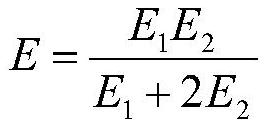Calculation method of elastic modulus of buffer layer
A technology of elastic modulus and calculation method, which is applied in the field of rockfall prevention and control engineering and collapse, and can solve the problems of poor applicability of disaster prevention and mitigation, and inapplicability of thick rock buffer layer, etc.
- Summary
- Abstract
- Description
- Claims
- Application Information
AI Technical Summary
Problems solved by technology
Method used
Image
Examples
Embodiment 1
[0036] The method for calculating the modulus of elasticity of the buffer layer comprises the following steps:
[0037] a. Calculate and obtain the particle characteristic parameters of the soil-rock buffer layer, including the soil-rock median particle size D, the soil-rock particle unevenness coefficient Cu and the soil-rock buffer layer compactness S. The soil-rock median particle size D refers to the particles with a weight percentage of 50% of the soil-rock particles Particle size, in mm; soil and rock particle unevenness coefficient Cu is calculated by formula 1;
[0038] Cu=D 60 / D 10 Formula 1
[0039] In the formula, D 60 is the particle size of 60% by weight of soil and rock particles, in mm; D 10 It is the particle size of 10% by weight of soil and rock particles, in mm;
[0040] b. Determine the type of soil and rock according to the median particle size D of the soil and rock, and calculate the elastic modulus M of the soil and rock;
[0041] When the media...
Embodiment 2
[0050] The method for calculating the modulus of elasticity of the buffer layer comprises the following steps:
[0051] a. Calculate and obtain the particle characteristic parameters of the soil-rock buffer layer, including the soil-rock median particle size D, the soil-rock particle unevenness coefficient Cu and the soil-rock buffer layer compactness S. The soil-rock median particle size D refers to the particles with a weight percentage of 50% of the soil-rock particles Particle size, in mm; soil and rock particle unevenness coefficient Cu is calculated by formula 1;
[0052] Cu=D 60 / D 10 Formula 1
[0053] In the formula, D 60 is the particle size of 60% by weight of soil and rock particles, in mm; D 10 It is the particle size of 10% by weight of soil and rock particles, in mm;
[0054] b. Determine the type of soil and rock according to the median particle size D of the soil and rock, and calculate the elastic modulus M of the soil and rock;
[0055] When the media...
Embodiment 3
[0066] The method for calculating the modulus of elasticity of the buffer layer comprises the following steps:
[0067] a. Calculate and obtain the particle characteristic parameters of the soil-rock buffer layer, including the soil-rock median particle size D, the soil-rock particle unevenness coefficient Cu and the soil-rock buffer layer compactness S. The soil-rock median particle size D refers to the particles with a weight percentage of 50% of the soil-rock particles Particle size, in mm; soil and rock particle unevenness coefficient Cu is calculated by formula 1;
[0068] Cu=D 60 / D 10 Formula 1
[0069] In the formula, D 60 is the particle size of 60% by weight of soil and rock particles, in mm; D 10 It is the particle size of 10% by weight of soil and rock particles, in mm;
[0070] b. Determine the type of soil and rock according to the median particle size D of the soil and rock, and calculate the elastic modulus M of the soil and rock;
[0071] When the media...
PUM
 Login to View More
Login to View More Abstract
Description
Claims
Application Information
 Login to View More
Login to View More - R&D
- Intellectual Property
- Life Sciences
- Materials
- Tech Scout
- Unparalleled Data Quality
- Higher Quality Content
- 60% Fewer Hallucinations
Browse by: Latest US Patents, China's latest patents, Technical Efficacy Thesaurus, Application Domain, Technology Topic, Popular Technical Reports.
© 2025 PatSnap. All rights reserved.Legal|Privacy policy|Modern Slavery Act Transparency Statement|Sitemap|About US| Contact US: help@patsnap.com



